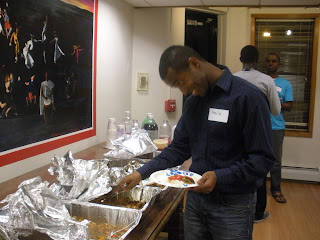Pics from the HSPH Africa Health Forum (AHF) Welcome Dinner
See the girl in the black shirt, cheesy smile...that's me!
2 HSPH Alumni and 1 current AHF E-Board member
Look at all that yummy West African food!
HSPH students who live in Shattuck International House (where I also work) joined the festivities
Friends and classmates of all backgrounds came to meet, greet, and eat
Me (right) and three of my favorite HSPH classmates!
On the other hand, it's frustrating to take courses that I don't see the relevance of at this stage of my life. Demography, biostatistics, economics...and the list goes on. I know that the methodologies these courses teach are useful in calculating public health-related data, and I know that I'll probably see the use for these courses more once I enter into the real world. It's just that all these numbers make my head spin! Who would have thought that an MSc in Global Health and Population would be so quantitative?!
Do these courses really have any use? Well, let's do a subject profile: take demography - the study of human populations. Last January, I spent 3 1/2 weeks in Mumbai, India - one of the top 5 most densely populated cities in the world.
One of the first pics I took in India through the window of the little "tuk tuk," the tiniest version of a taxi I've ever seen!
A tour of the Shiva god cave-temples on Elephanta Island with some Harvard Business School students that I met in India
Me getting mehndi (henna) work, a traditional Indian art applied for special occasions
Fellow classmate and close friend (left) and I pose with Deepak Mazumdar and Jhelum Paranjape, two traditional Indian dancers who performed "Geet Govind" ("a symbolic representation of the love of Krishna and Radha - a metaphor of human yearning for divine union") at the National Center for Performing Arts
No matter where we went around the megacity, there were streams and streams of people, cars, and traffic of all sorts! Even in all my travels around Nigeria, Senegal, Kenya, and southern Africa, I had never seen anything like it!
Me inside Haji Ali's mosque, home of the tomb of Muslim saint Haji
Hundreds of people wait for the train...
Now, I didn't go to India just for vacation; I went for a Winter Session field study program on health in urban slums with Dr. Richard Cash, one of the inventors of Oral Rehydration Therapy (http://en.wikipedia.org/wiki/Richard_A._Cash). I worked closely with a small team of students to conduct a mini research project on hand washing and food preparation techniques among female adolescents in Cheeta Camp Slum Urban Health Center, with the goal of better understanding what factors contribute to positive habits that avert related illnesses in this community.
Me, HSPH group, and Dr. Cash (left, back)
Group of young women taking vocational training classes at Cheeta Camp Urban Health Center pose with me and my research group members
More young women that we surveyed in vocational training classes
Students we surveyed at one school near Cheeta Camp Slum
#1) Cultural competency is incredibly important in creating effective health programs and policies.
- Anyone who knows me knows that this is my platform! If policies and programs don't demonstrate an understanding of the cultural contexts in which they are meant to be implemented, they will never have the impact on improving the situation in these communities.
- Towards the end of demography, I remember we talked briefly about methods whereby you can model what the pattern of disease would be among a population if one disease were to be eradicated. In situations where we have to set priorities (i.e., everywhere!!), this can help to identify which interventions may have the largest impact.
- The downside to classes here at HSPH are that they largely focus on theory and research, research and theory, great information but little implementation. Courses are taught by some of the leading researchers in their respective fields, but unfortunately, that doesn't translate to providing me with a tangible skill set (outside of number crunching) that will allow me to make the difference I hope to make.
An economist, demographer, or biostatistician might disagree with me, but I firmly believe that the answer is yes! Because behind every number - no matter how many or few - is a face and a name. That's part of the reason why I'm now working as a research assistant conducting qualitative research...a very exciting and rewarding project that I'll have to share more details on next time!
Ila al-liqaa! (until we meet again)
Knowing is not enough; we must apply. Willing is not enough, we must do.
-From German Playwright Johann Wolfgang von Goethe

















Hi Yvette,
ReplyDeleteI know it's been a while since you posted this but I was wondering if your view of HSPH has changed since. In particular, your comment on HSPH's focus on research/theory/academia over implementation/practice struck home, as I, like you, plan to work in the field after graduation. The choice is between JHSPH and HSPH, and your comments confirm my suspicion that HSPH is much more research-oriented than practice-based. Please feel free to email me at mferng@gmail.com with more thoughts - I'd love to chat. Thanks!